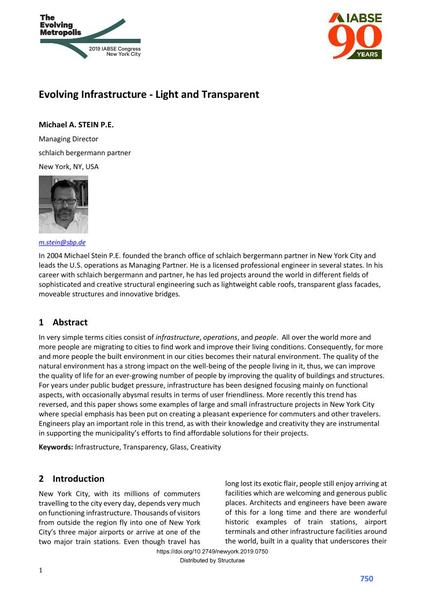Evolving Infrastructure - Light and Transparent

|
|
|||||||||||
Bibliografische Angaben
| Autor(en): |
Michael A. Stein
(schlaich bergermann partner)
|
||||
|---|---|---|---|---|---|
| Medium: | Tagungsbeitrag | ||||
| Sprache(n): | Englisch | ||||
| Tagung: | IABSE Congress: The Evolving Metropolis, New York, NY, USA, 4-6 September 2019 | ||||
| Veröffentlicht in: | The Evolving Metropolis | ||||
|
|||||
| Seite(n): | 750-756 | ||||
| Anzahl der Seiten (im PDF): | 7 | ||||
| DOI: | 10.2749/newyork.2019.0750 | ||||
| Abstrakt: |
In very simple terms cities consist of infrastructure, operations, and people. All over the world more and more people are migrating to cities to find work and improve their living conditions. Consequently, for more and more people the built environment in our cities becomes their natural environment. The quality of the natural environment has a strong impact on the well-being of the people living in it, thus, we can improve the quality of life for an ever-growing number of people by improving the quality of buildings and structures. For years under public budget pressure, infrastructure has been designed focusing mainly on functional aspects, with occasionally abysmal results in terms of user friendliness. More recently this trend has reversed, and this paper shows some examples of large and small infrastructure projects in New York City where special emphasis has been put on creating a pleasant experience for commuters and other travelers. Engineers play an important role in this trend, as with their knowledge and creativity they are instrumental in supporting the municipality’s efforts to find affordable solutions for their projects. |
||||
| Stichwörter: |
Transparenz Glas Infrastruktur
|
||||
